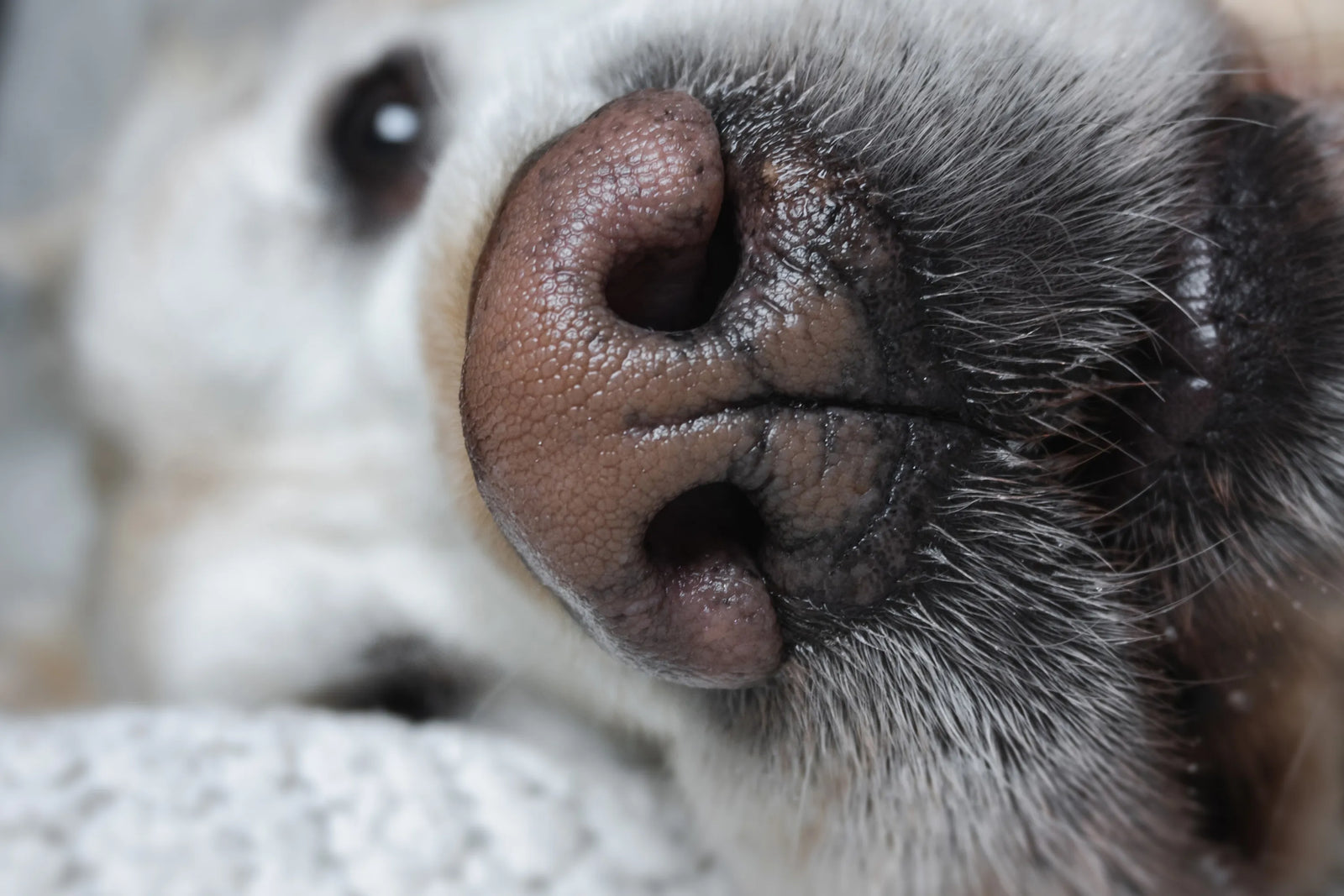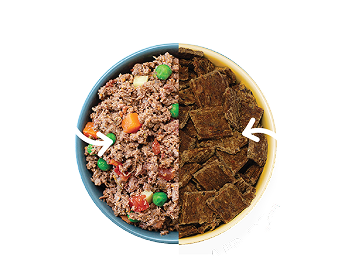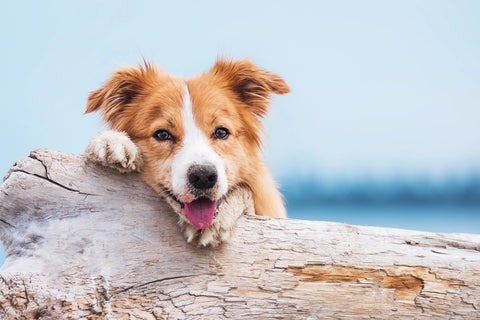
Why Are Dogs Noses Wet?
Ever noticed your dog's nose often feels wet? This quintessential doggy trait, while common, holds more significance than you might think.
Here at A Pup Above, we're just as curious about the small wonders of our canine pals as we are about their nutrition and health. A dog's wet nose isn't just a fun fact—it's a vital aspect of their sensory world.
Join us as we explore the reasons behind this mystery and its implications for your dog's well-being.
What Makes a Dog’s Nose Wet?
A dog's wet nose is a fascinating blend of biology and function. Here's an in-depth look at why our canine companions often have damp snouts:
Natural Mucus Secretion
Dogs have special glands in their noses that produce mucus. This secretion is key to maintaining moisture on the nose's surface. The mucus keeps the nose supple and enhances the dog’s ability to pick up and interpret different scents.
Self-Moistening Through Licking
Dogs frequently lick their noses. While it may seem like a simple grooming habit, this behavior plays an important role in keeping their nose wet. Each lick transfers moisture from the tongue to the nose, helping to keep it well-hydrated.
The Science of Smell
The moisture on a dog's nose is vital for their exceptional sense of smell. It works by trapping scent particles in the air.
When these particles dissolve in the moisture, they are more easily detected by the nose's sensory cells. A wet nose, therefore, acts as a potent tool for dogs to explore and understand their environment through olfactory cues.
Environmental and Health Factors
A variety of factors can influence the wetness of a dog's nose. These include the dog's overall hydration, the humidity of their environment, and their level of activity.
It's also worth noting that at certain times of the day, like after a nap or in the morning, a dog's nose might be drier compared to other times.
Breed Variations
Some dog breeds have naturally wetter noses than others. This can be due to their specific breed characteristics, such as the shape of their nose or their genetic predisposition towards certain glandular activities.
A Sign of Good Health
While a consistently moist nose is generally a sign of good health, it's crucial to understand that a dry nose doesn't automatically indicate illness. Several benign reasons can lead to a dry nose, and it's often a temporary condition.
What Causes Dry Nose?
While a wet nose is typical in dogs, there are times when your pup's nose may seem unusually dry. Understanding what contributes to this change is key to ensuring your dog’s well-being.
A dry nose in dogs can be attributed to a variety of factors, none of which are necessarily alarming:
- Environmental Conditions: Like our skin, a dog's nose can react to environmental factors. Low humidity, hot or cold weather, and exposure to wind or sun can all lead to temporary dryness in your dog’s nose.
- Aging: As dogs age, they might experience changes in their body's ability to regulate moisture, leading to a drier nose. This is a normal part of the aging process and usually doesn’t indicate any health issues.
- Rest and Sleep: Dogs’ noses can dry out during long periods of rest or sleep when they're not licking their nose as frequently. This is why you might notice your dog’s nose is drier first thing in the morning.
- Breed Specificity: Certain breeds, particularly those with shorter snouts, may be more prone to having a dry nose. This is often due to their unique facial structure and not a cause for concern.
- Dehydration: Though less common, dehydration can sometimes cause nose dryness. Ensuring your dog has constant access to fresh water can help prevent this.
- Allergies or Illnesses: Occasionally, allergies, infections, or other illnesses can lead to a dry nose. If the dryness is accompanied by other symptoms like discharge, lethargy, or changes in appetite, it’s advisable to consult a veterinarian.
As mentioned, a dry nose isn’t typically a sign of trouble. However, it’s always good practice to monitor any changes in your dog’s health and seek professional advice when necessary.
Tips To Support a Healthy Nose and a Happy Pup
A healthy nose is key to a dog's well-being, and as pet parents, there's much we can do to support this.
From diet to daily care, let's dive into some essential tips to keep your furry friend's nose in great shape.
- Hydration Is Key: Keeping your dog well-hydrated is crucial. A moist nose is a happy nose, and water plays a significant role in this. Ensure your dog has constant access to clean, fresh water to help maintain their nose's natural moisture.
- Protect Against the Elements: Just like we protect our skin, our dogs’ noses need safeguarding from harsh weather. Use a pet-safe balm to shield their noses from the sun's rays and biting cold winds.
- A Balanced Diet for Overall Health: A nutritious diet is the foundation of good health. At A Pup Above, we understand this well. Flavors like Chicka Chicka Bow Wow and Porky’s Luau not only tantalize their taste buds but also support their overall health, including that of their noses.
- Regular Vet Visits: Routine check-ups help catch any underlying issues that might affect your dog’s nose health. It’s always better to be proactive than reactive when it comes to their health.
- Mindful Grooming: Keep the area around your dog’s nose clean and well-groomed. For breeds with longer fur, gently trim the hair around the nose to prevent irritation.
- Watch for Allergies: Be aware of signs of allergies, as these can affect nose moisture. If you notice persistent dryness along with other allergy symptoms, it's best to consult your vet.
- Use a Humidifier: If you live in a dry climate, consider using a humidifier in your home. This can help add moisture to the air and benefit your dog’s nose.
- Limit Exposure to Irritants: Avoid exposing your dog to strong chemicals or irritants like cigarette smoke, which can dry out or irritate their nose.
- Nose Checks: Regularly check your dog’s nose for any signs of cracking, dryness, or discharge. Early detection of any abnormalities can lead to quicker treatment and resolution.
- Encourage Rest in Comfortable Settings: Ensure your dog has a comfy place to rest. A well-rested dog is a healthy dog, and this includes their nose health.
Incorporating these tips into your dog care routine can help ensure your dog’s nose remains healthy.
The Bottom Line
So there you have it, the scoop on why your dog's nose is often wet and what it means for their health. At A Pup Above, we're passionate about every little detail of canine life, including those cute, wet noses.
Remember, a dog's nose is a crucial tool for exploring the world. Keeping your pup's nose healthy is a blend of good nutrition — like our delicious A Pup Above recipes — mindful care and regular vet check-ups.
By understanding and attending to their needs, from their wet noses to their wagging tails, you're ensuring they live their happiest, healthiest lives. After all, a happy pup means a happy pet parent, and that's what we're all about!
Sources:
Why Do Dogs Have Wet Noses? | Wonderopolis
Why do dogs have wet noses? | Ask Dr. Universe
Top Stories

Why Do Dogs Lick Their Paws?

Why Do Dogs Whimper & Make Noises in Their Sleep?

Healthy Vet-Approved Homemade Dog Food Recipes

How To Cook Sweet Potatoes for Dogs






















